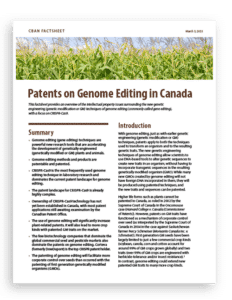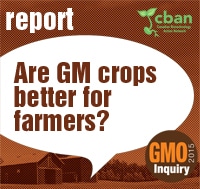Patents
“Intellectual property” refers to a group of laws – such as patents, Plant Breeders’ Rights, copyright, trademarks and trade secrets – intended to protect inventors and artists from losing control over their intellectual creations/ideas. Intellectual property has become a powerful tool for corporations to create monopolies and consolidate market power. Monopoly control over plants, animals and other life forms jeopardizes world food security and threatens to increase the economic insecurity of farming communities.
“…whoever controls access to seed has great power over our farms, our food supply and ultimately our population. We disagree with the premise that plant breeding must be considered a profitable investment by private breeders. Instead, we see plant breeding as a public good, and the resulting varieties as part of the global commons for the benefit of all. Farmers, and particularly Indigenous farmers, created our seed heritage over millennia.” – National Farmers Union, Submission to CFIA Consultation regarding Proposed amendments to the Plant Breeders Rights Regulations, August 2024.
On this page
Updates
 February 2025: The industry association Seeds Canada has set up a “Seed Tip Line” to report “suspicious seed activity. “Seeds Canada has introduced a new tool to help safeguard seed innovation and protect intellectual property rights in the plant breeding industry.”
February 2025: The industry association Seeds Canada has set up a “Seed Tip Line” to report “suspicious seed activity. “Seeds Canada has introduced a new tool to help safeguard seed innovation and protect intellectual property rights in the plant breeding industry.”
October 15, 2024: The European Patent Office has rejected a complaint against a patent held by the company, KWS, on cold-tolerant maize (EP 3380618). The international coalition of No Patents on Seeds! filed the complaint because patents on conventionally-bred plants and plant varieties are not permitted in Europe.
In its decision, the EPO invoked a controversial clause which states that the prohibition is only applicable to patent applications filed after 1 July 2017. KWS filed its application in 2016.
October 2024: The report Seed patents: A huge challenge for the European Union – Analysis of the problem, case studies and potential solutions from No Patents on Seeds! find that, although Europe only permits patents on genetically engineered plants, the European Patent Office has already granted hundreds of patents on conventionally bred plants, affecting over 1300 European plant varieties. The development threatens to block conventional plant breeding in Europe.
August 2024: The Canadian Food Inspection Agency is proposing amendments to the Plant Breeders’ Rights Regulations. The consultation was scheduled from May 29 – July 12, 2024, allowing just 45 days during the busiest time of year for those most affected by the proposed changes: farmers, horticulturalists, and orchardists. The National Farmers Union says: “Canada’s current Plant Breeders’ Rights legislation and regulations are compliant with UPOV ’91. The proposed amendments would go beyond what is required by UPOV ’91, boosting the rights of plant breeders at the expense of farmers, both financially and regarding the scope of their farming practices. The proposed amendments would make seed and other propagating material less available to farmers, and/or would increase their costs by requiring annual royalty payments, for more years. The proposed amendments would also increase the ability of plant breeding companies to monopolize genetic material by preventing farmers from reproducing it for their own use on their own holdings.” Read more in the NFU Submission to CFIA Consultation regarding Proposed amendments to the Plant Breeders Rights Regulations, August 2024.
March 2024: GM purple tomato company targets non-GMO seed company over alleged patent infringement
July 2023: Research in Europe by Testbiotech shows Bayer and Corteva own the highest overall number of patents and have also filed the highest number of patent applications. “If this development is not stopped, plant genomes will become a ‘minefield’ of patent monopolies.” New GE patents 2022: ‘Second-hand GE’ plants claimed as inventions, Testbiotech, July 7, 2023
CBAN Factsheet – Patents on Genome Editing in Canada, March 3, 2022
Ownership of the CRISPR-Cas9 patent families show that licenses are dominated by the major companies already invested in genetic engineering and that dominate the global commercial seed and pesticides markets. Corteva (formerly DowDuPont) holds more patents on CRISPR technology for agriculture than any other company or institution in the world.
The use of CRISPR in genome editing opens up new crops and traits to genetic engineering (genetic modification or GM) because of its speed and because the technology gives access to previously inaccessible areas of the genome for manipulation. Patenting of genome editing tools and products are therefore expected to significantly expand plant-related patents, and lead to more crop kinds with patented GM traits on the market. A wider proliferation of genetically engineered seeds via the use of genome editing across many crop kinds means that more farmers would be planting patented seed and confronted with having to conform to patent protection measures. An increased use of GM seed across the country would also increase the risks of GM contamination, and raise related patent infringement concerns among farmers who are not using those genome-edited varieties. If, as the Canadian Food Inspection Agency and Health Canada propose, many genome edited plants and foods (those with no foreign DNA) are exempted from regulation, then we can expect companies to focus on developing those products for commercial release, resulting in a flood of unregulated, unidentified, patented genetically engineered seeds and foods.
“Monopolistic claims on patented technology and possible implications for competition associated with the introduction of New GE in plant biotechnology, make disruptive processes in plant breeding, agriculture and food production highly likely. This development is in strong contradiction to repeatedly voiced arguments stating that CRISPR/Cas technology would be cheap, and therefore more accessible for smaller and medium sized breeding companies.” – From Testbiotech: New GE and food plants: The disruptive impact of patents on breeders, food production and society, June 2021
Patents
“Intellectual property” refers to a group of laws – such as patents, Plant Breeders’ Rights, copyright, trademarks and trade secrets – intended to protect inventors and artists from losing control over their intellectual creations/ideas. Intellectual property has become a powerful tool for corporations to create monopolies and consolidate market power. Monopoly control over plants, animals and other life forms jeopardizes world food security and threatens to increase the economic insecurity of farming communities.
Patent protection over new genetic sequences is one legal mechanism that takes ownership of seeds out of the hands of farmers. A patent is granted to an inventor to allow them to make a profit from their work by excluding others from making, using, importing and selling it for a set period of time, usually fifteen to twenty years. Although Canada does not permit the patenting of plants themselves, new genetic sequences in plants can be patented, and patent-holders can stipulate the conditions under which the patented genetic material can be used. In practice, this means that patents allow the company that has developed a GM trait to forbid farmers from saving and replanting seeds with that trait, and public breeders from further selecting or developing it.
Patents also mean that farmers can be found in violation of intellectual property rights if seeds or plants with patented gene sequences are found on their farms. Companies such as Monsanto monitor compliance by conducting “field checks” on farmers’ fields, and encouraging farmers to report possible cases of patent infringement, or what Monsanto calls “seed piracy.” As farmers in Canada and the US have discovered, this can mean being taken to court. By 2013, Monsanto had more than 1,676 patents on seeds, plants and other agricultural applications, and had filed at least 144 seed patent infringement lawsuits in the US, involving 410 farmers and 56 small businesses in 27 states.
In the pursuit of controlling farmer access to their GM technology, companies have also developed “Terminator” technologies (Genetic Use Restriction Technologies) that could provide biological patent enforcement. Such GM technologies make seeds sterile after first harvest. Terminator technology was jointly developed by the US. Department of Agriculture and seed company Delta & Pine Land (subsequently bought by Monsanto). In response to global farmer protests, there is an international moratorium on field-testing and commercializing Terminator technology, at the UN Convention on Biological Diversity. This moratorium is constantly under threat.
Large seed companies with GM investments spend billions of dollars on patents and patent lawyers, and on policing farmers. This system of legal controls, along with possible biological controls, exists to turn seeds into commodities that corporations can profit from, and take seeds out of the hands of farmers. For references and more information see CBAN’s report “Are GM Crops Better of Farmers?”
In 2007, Canadian farmer Percy Schmeiser and his wife Louise were given the Right to Livelihood Award “… for their courage in defending biodiversity and farmers’ rights, and challenging the environmental and moral perversity of current interpretations of patent laws”. In 1998 Percy Schmeiser and his wife received a letter from Monsanto claiming that they had used Monsanto’s genetically engineered canola seeds without a license. However, the Schmeisers had never bought Monsanto’s seed. Instead, Percy Schmeiser said that some of Monsanto ‘Round-up Ready’ genetically modified canola seeds had blown on to their land from passing trucks. Monsanto sued the Schmeisers for ‘infringement of patent’, seeking damages totalling $400,000, including about $250,000 in legal fees, $105,000 in estimated profits from the Schmeisers’ 1998 crop, $13,500 ($15 an acre) for technology usage fees and $25,000 in punitive damages. At the same time, Monsanto offered to withdraw the legal challenge if the Schmeisers signed a contract to buy their seeds from Monsanto in the future and to pay the “Technology use fee”. But the Schmeisers contested the case all the way up to the Supreme Court of Canada: the final ruling supported Monsanto in the company’s claim to own the gene however, the court also concluded that Schmeiser should not have to pay anything to Monsanto because they had not in any way benefited from having the seeds on their property. For more information see: In Memoriam: Percy Schmeiser. Saskatchewan farmer Percy Schmeiser died at 89, on October 14, 2020. “Corporations should not be able to control people, seeds, plants, and food through patent law.”
Biopiracy, a term originally coined by ETC Group, refers to the appropriation of the knowledge and genetic resources of farming and indigenous communities by individuals or institutions that seek exclusive monopoly control (patents or intellectual property) over these resources and knowledge. ETC Group believes that intellectual property is predatory on the rights and knowledge of farming communities and indigenous peoples. Through nanotechnology- and synthetic biology-related patents, intellectual property claims are now being extended to elements of the periodic table and to key metabolic pathways involved in cellular functioning (and resulting in natural products with high commercial value).
Resources
- CBAN Factsheet – Patents on Genome Editing in Canada, March 3, 2022
- Are gene-editing technologies traditional? Not if they are linked to intellectual property rights, Katherine Garnett, A Bigger Conversation, 2021.
- The Price of Patented Seed – The Value of Farm-Saved Seed, National Farmers Union, 2013





